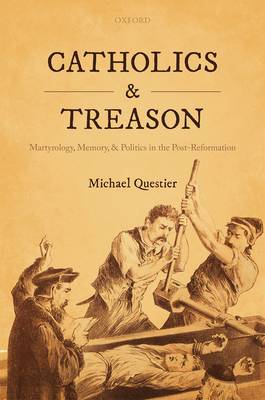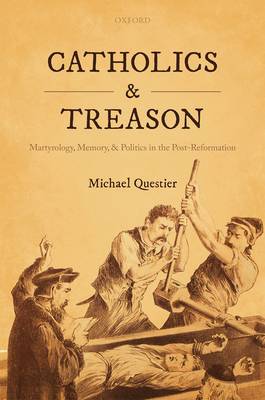
- Afhalen na 1 uur in een winkel met voorraad
- Gratis thuislevering in België vanaf € 30
- Ruim aanbod met 7 miljoen producten
- Afhalen na 1 uur in een winkel met voorraad
- Gratis thuislevering in België vanaf € 30
- Ruim aanbod met 7 miljoen producten
Zoeken
Catholics and Treason
Martyrology, Memory, and Politics in the Post-Reformation
Michael Questier
Hardcover | Engels
€ 233,95
+ 467 punten
Omschrijving
Catholics and Treason takes the narratives generated by the contemporary law of treason as it applied to Roman Catholics, during and after the Reformation of the Church in the sixteenth century, and uses them to explore the Catholic community's writing of its own history. Prosecutions of Catholics under the existing law and via new legislation produced a great deal of documentation which tells us much about contemporary politics that we could not garner from any other source. The intention here is to locate the narratives of persecution inside the context of the 'mainstream' history of the period from which, for the most part, they have been routinely excluded but out of which they partly emerged. In that respect, this is the history of the post-Reformation Church and State with the politics (of violence) put back. This volume takes as its starting point the magnum opus of Bishop Richard Challoner, his Memoirs of Missionary Priests, and it works backwards from that book into the period that Challoner describes. Historian Michael Questier seeks to reassemble as far as possible the historical jigsaw puzzle on which Challoner laboured but which he could not complete, thinking about the implications for our view of the post-Reformation and of the way in which Challoner and others described the Catholic experience of in/tolerance.
Specificaties
Betrokkenen
- Auteur(s):
- Uitgeverij:
Inhoud
- Aantal bladzijden:
- 688
- Taal:
- Engels
Eigenschappen
- Productcode (EAN):
- 9780192847027
- Verschijningsdatum:
- 8/06/2022
- Uitvoering:
- Hardcover
- Formaat:
- Genaaid
- Afmetingen:
- 165 mm x 241 mm
- Gewicht:
- 1297 g

Alleen bij Standaard Boekhandel
+ 467 punten op je klantenkaart van Standaard Boekhandel
Beoordelingen
We publiceren alleen reviews die voldoen aan de voorwaarden voor reviews. Bekijk onze voorwaarden voor reviews.











